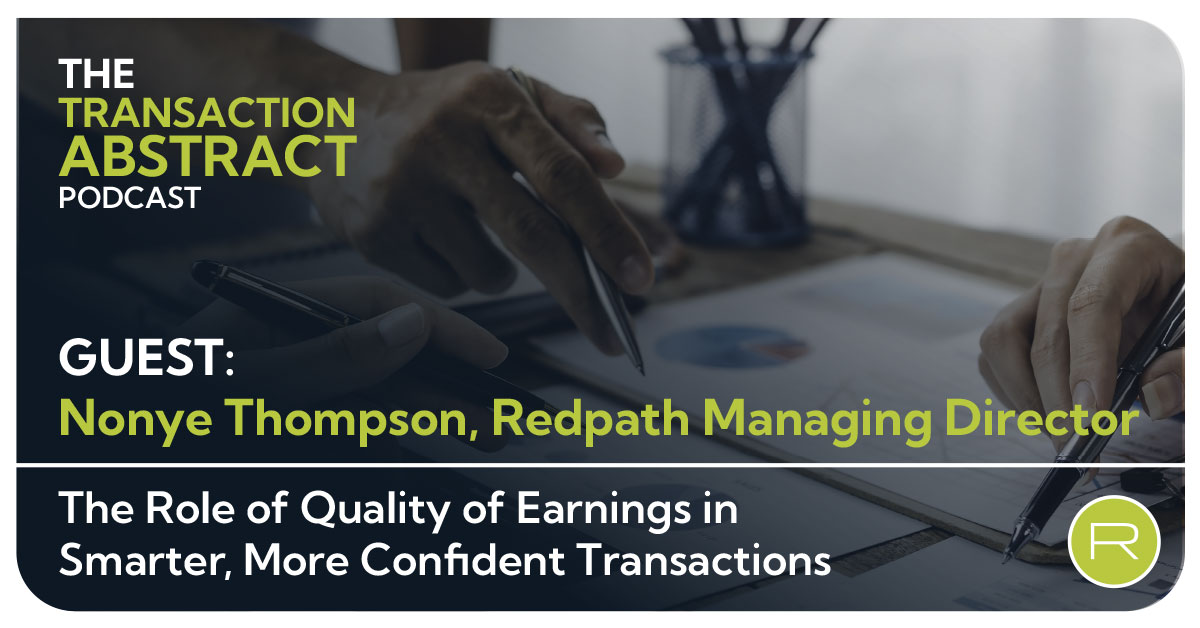The Role of Quality of Earnings in Smarter, More Confident Transactions
In this episode of The Transaction Abstract Podcast, Joe Hellman sits down with Nonye Thompson, Managing Director in Redpath’s Transaction Advisory...
![How to Attract Mezzanine Capital [PODCAST]](https://www.redpathcpas.com/hubfs/How%20to%20Attract%20Mezzanine%20Capital%2012.22-1%20(1).jpg)
If you are a business owner looking to raise capital, or possibly eyeing your own exit, you may have the perfect companion in a mezzanine capital lender. But do you know what a firm like that is looking for in a business?
Dave Sampair, Principal at Yukon Partners, ran down a list of items when he spoke with Joe Hellman on The Transaction Abstract podcast. Yukon Partners is one of the larger private capital groups in the Twin Cities and does business with companies all across the country. Learn how Yukon Partners evaluates companies and structures deals as well as what it recommends your business does to get the attention of investors by listening to the full podcast.
Dave starts by explaining where a firm like Yukon Partners can fit into a company’s capital strategy. When they partner with a company, Yukon Partners offers millions of dollars in unsecured debt and takes on an equity stake.
“We call it a blended strategy,” says Dave, “where we're earning returns for our investors by having that current income from the interest of the debt. And then we're also going to be up on equity if you are successful—which is the ultimate goal of private equity, helping a business succeed.”
Dave says Yukon Partners is “typically doing transactions with companies with an EBITDA of $10M to $60M. Our average check size is in the $25M to $35M range between our debt and equity. Typically we have 75% to 80% of our dollars invested in debt and 20% to 25% in equity.”
Dave notes the ratio varies because each deal is unique. Some may be a 50/50 split or 90% debt and only 10% equity.
Dave adds that for the past 10 years or so, capital has been relatively cheap spurring a lot of M&A transactions. However, with interest rates up significantly in 2022 and with inflation running high and the potential for a recession, things have slowed down. There are still deals being done, though, and many companies are turning to junior capital players–like private equity.
Dave points out that in the past a company may have been able to get $100M at a good rate from a senior lender, like a bank. These days a bank may only be willing to put out $70M towards that same deal, leaving a $30M gap to fill. This is where a mezzanine lending group, like Yukon Partners, can fit nicely. The junior debt they offer can be attractive for two reasons.
First, senior lenders typically offer money on a floating rate that is tied to SOFR or LIBOR. The Secured Overnight Financing Rate is set by the New York Fed and the London Interbank Offered Rate is set by the Intercontinental Exchange in Europe. If a loan is tied to these rates, then when they go up the rate on the loan goes up too.
This can make the fixed price that Yukon Partners or another junior debt partner offer attractive to a company that wants to know exactly what its cost of capital will be (and not be surprised if rates go up). The rate for junior debt will be higher, but it will not be secured against company assets.
Second, private equity can be flexible and move much faster. Dave says that since the pandemic, people are putting more stock in knowing exactly who their partners are: “I'd rather do deals with the people I like and I trust, and I need a guy in the foxhole that is going to be patient, flexible, and able to manage through some things.”
“You've got to have good management teams—more now than any time in the last ten or 12 years,” says Dave “because they're going to be managing through issues with their customers, with their suppliers, and with inflation.”
Dave says a strong finance department is a must for his team to consider partnering with a company. He has examples where they thought they could fix a weak accounting function down the road. “It's always way worse and way harder than you ever think. So I think having a CFO or somebody who can do that at the company is essential.”
Dave says Yukon Partners is focused on companies that are in growing markets—and will not be affected by wide volatility swings.
There are specific metrics you must be ready to have closely scrutinized. Private equity investors will want to see:
A private equity firm will ask questions like these:
Dave likes to see a company’s KPIs and dashboards–but it is important that the measurements are worthwhile and actually in use.
This all feeds the two main items any private equity company will be looking for: consistency and stability. It is critical for investors to know that money will come into servicing debt. The belief is that a strong management team will handle operations well and deliver on the other part of the blended strategy–ensuring the equity stake in your company appreciates as the company succeeds.

In this episode of The Transaction Abstract Podcast, Joe Hellman sits down with Nonye Thompson, Managing Director in Redpath’s Transaction Advisory...

In this episode of The Transaction Abstract Podcast, Joe Hellman sits down with Dan Hennessey, the newly appointed CEO of Sam Schwartz Pedestrian...
![Common Legal Pitfalls in M&A Transactions with Kim Lowe [PODCAST]](https://www.redpathcpas.com/hubfs/Podcast-Legal-Pitfalls-Kim-Lowe.jpg)
In this episode of The Transaction Abstract Podcast, Joe Hellman sits down with Kim Lowe, Partner at Avisen Legal, to discuss the most common legal...